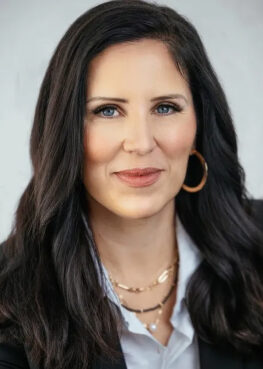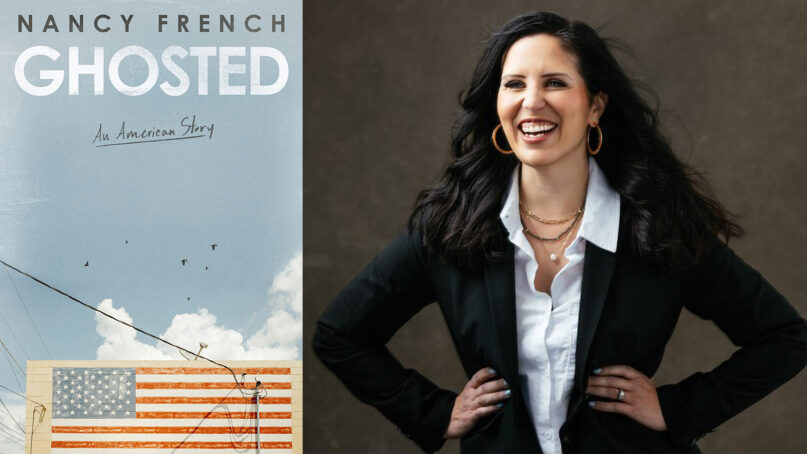(RNS) — Nancy French’s approach to life can be summed up in a line from a hit Van Halen song.
“Might as well jump.”
At age 20 she dropped out of college to get married and move to New York with a man she barely knew, later talked her way into a career as a ghostwriter by hopping on a plane to Alaska to interview Bristol Palin and once collided with Sen. Mitt Romney on a mountain in Utah while pretending she was an experienced skier.
That fearless approach to life made French a five-times New York Times bestselling author and the go-to ghostwriter for viral celebrities from “The Bachelor” and “Dancing With the Stars,” as well as conservative political influencers.
Things were going great. Enter Donald Trump.
When French and her husband, David, a conservative lawyer turned author and New York Times columnist, criticized Trump’s rise to political power, the two became pariahs in the conservative circles they once called home. Both friends and former clients cut her off as too radioactive to work with.
Things got worse when she shared about being abused as a teenager after hearing people dismiss allegations against former Alabama Supreme Court Justice Roy Moore for past sexual misconduct with teenagers.

Nancy French. (Courtesy photo)
French said she went from ghostwriter to ghosted in a heartbeat.
“I’d revealed my true self, and my fellow conservatives had found me contemptible,” she writes in her new memoir, “Ghosted,” out Tuesday (April 16) from Zondervan. The book traces her story, from her exploits as the best shot in her middle school hunter safety class to her surprising writing success to her post-Trump life, including a recent appearance on the “Moth Radio Hour,” recounting how David Lee Roth almost ruined her marriage.
The memoir is a story of friends lost and found and starting over after the life you thought you had vanishes.
“It’s me reaching out my hand and saying, ‘Hey, do you feel spiritually homeless, geographically homeless, ideologically homeless, culturally homeless?’” she said in a recent interview with Religion News Service. “If so, I feel that way, too. Let’s talk.”
The book begins with French showing up at her house just south of Nashville, Tennessee, to find an FBI agent’s card taped to her mailbox and learning that a credible death threat had been issued against her and her husband. Then it flashes back to scenes from a childhood in rural Tennessee, peeling apples with her grandmother in the kitchen and sneaking a peak at her great-grandfather’s Klan robe.
French said she began the book by talking about her roots because in recent years she’s often been told she is an elitist who doesn’t understand the Southerners who supported Trump. That galls French, a three-time college dropout raised in the Bible Belt.
“You can’t out-Tennessee me,” she said. “You can’t out-rural me. Literally, my terminal degree is from Henry County High School in 1993. I wanted to show people a little bit of my biography so they would not feel the need to have to explain to me what Tennesseans are like.”
From an early age, French recounts her life as filled with ambition and sorrow. She grew up in the Church of Christ, a denomination known for its a cappella singing — the church’s teaching bans musical instruments in service — and conservative beliefs, especially about sexuality.
During her teen years, however, a young pastor began paying attention to her and eventually began to abuse her — an experience that haunted her for years. When she learned years later he’d been fired for a different case of abuse, she felt guilty for not reporting him earlier — wondering if she could have prevented him from hurting others.
She escaped her small town and found herself at Lipscomb University in Nashville, in part because of a cold call from David, a Lipscomb alum who reached out to her at the school’s request to recommend it. There she made friends with a girl named Virginia, who was beautiful and kind and, like her, filled with moxie and a bit of a misfit within the school’s conservative culture.
The two had planned to take a long trip together during a break but French had to cancel at the last minute because of a family funeral. Virginia went and died in a car wreck.
“We were co-belligerents at our university that we felt was oppressing us,” French said. “I’ve never been the same since she died. But I am better off for her friendship. Knowing her and being friends with her was so transformative for my life. Which also meant that when she died, it was so much worse.”
Neither her faith nor her classmates could comfort her. For weeks French kept a final note from Virginia on the dry-erase board outside her door. Then one day, a classmate erased it, saying it was too depressing, French recalls.
She found hope eventually in her faith and in her friendship with David, which turned into a whirlwind romance. The two — much to the chagrin of some of their friends — flew to Paris to get married when she was 20. Things got off to a rough start, as their luggage was lost and the boat they had planned to be married on sunk. But they made the best of it.
Her ghostwriting career was built on a mix of kindness, grit and the ability to tell stories fast. French’s first bestseller was a collaboration with Bristol Palin, then a reality TV star and daughter of former Alaska governor and vice presidential candidate Sarah Palin. French had written a novel that went nowhere and was looking for another project when her agent told her Bristol Palin needed a ghostwriter who could work fast.
Before long she was on a plane to Alaska and hanging out at the Palins’ house and then cranking out “Not Afraid of Life,” Bristol Palin’s 2011 bestseller. The two remain friends.
“I love that woman,” said French. “She was trying to navigate some complicated waters — and people were so uncharitable to her.”
That bestseller opened the door to a new career for French, who had a knack for putting herself in other people’s shoes and hearing their stories — something she describes as a sacred experience.
She has few regrets for her earlier work in conservative circles. She has strong beliefs and loved the give and take of writing about politics.
“I had the ‘conservative talking points’ down to a science,” Nancy writes. “I could write about American military strength, ‘family values,’ and personal responsibility and know exactly how it would be received among other conservatives.”
She felt betrayed when folks who once shared those beliefs appeared to have abandoned them. French said she didn’t change, but the world around her changed and folks that she once went to church with and called friends turned their back on her.
That has brought a sense of loss as well as a sense of clarity.
“It’s actually helpful to know who hates you because of Trump,” she said. “I’m really glad that I’m not hanging out with these people at Christian gatherings anymore.”
There has also been some joy in recent years, in particular, in an unexpected friendship with the staff of the “Moth” — the popular public radio storytelling show. In a recent episode, she told the story of her early married life and how David Lee Roth helped teach her to believe in love.
She also told in social media posts of the support she’d received from her husband and friends after being diagnosed with an aggressive cancer.
“Please pray for me today,” she wrote on X on Wednesday (April 17), the day after the book launched, when she was to receive a form of chemotherapy called the “red devil.” She’s also posted about looking for a wig during cancer treatment and about the toll the cancer and the treatment are taking on her.
Unlike some of her peers who grew up in Christian homes and conservative circles and felt unmoored from faith after the rise of Trump, she remains confident in God, if not in her fellow believers. That faith in her fellow Christians was tested more recently when French began reporting on abuse at Kanakuk, one of the nation’s most popular Christian camps.
“I feel like I’m holding on to Christianity by my fingernails,” said French, who wrote “Ghosted” while being treated for cancer. “But I just know that God has shown up for me over and over and over. I just feel very close to God, even if I feel distant from the church.”





